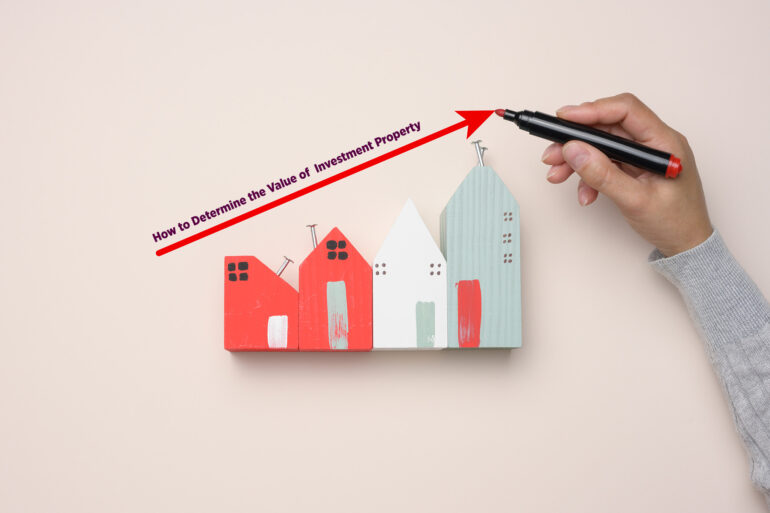How Do You Determine the Value of an Investment Property
If you want to invest in real estate, you’ll need to understand how to value investment property. Real estate investing can be an excellent way to accumulate wealth, but it is not without risk. When determining the value of an investment property, you must take several factors into account, including the property’s location, condition, and potential for rental income or appreciation. There are a few key considerations when valuing an investment property. First and foremost, learn the property’s location. A property in a desirable location is more likely to increase in value and may be easier to rent. Following that, you must examine the property’s condition. A fixer-upper may be a great deal, but restoring it to rentable condition will take time and money. Finally, learn whether the property has the potential for rental income or appreciation.
Using multiple approaches to gain a better understanding of a property’s value is the best way.
Methods of Real Estate Valuation
The GRM (Gross Rent Multiplier) approach is a simple method for estimating the value of a property. The GRM is calculated by dividing the current market value or purchase price of the property by the gross annual rental income. A property’s value is equal to its gross rent multiplied by its price or value.
Using multiple approaches to gain a better understanding of a property’s value is the best way. The GRM approach is one of the quickest ways to calculate an investment property’s profitability by comparing it to the profitability of similar properties in the same market. Using a sales comparison approach, a property is valued by calculating the cost of other homes and by building a similar structure.
Then, you have the rental strategy, but this tends to be commonly used in commercial real estate investing. You have a number of approaches to examine, but using the sales comparison approach is popular because investors get to estimate the value based on its estimated income.
You will also gain perspectives and action plans you might never have imagined if you use a skilled independent appraiser to assist in valuing your property. Until another party offers their perspective, you never know what you might be missing or what might be preventing you from moving forward.
Another method of valuing your property is the cost approach method, which estimates the price a buyer should pay for a piece of property is equal to the cost to build an equivalent building. The cost approach states that the property’s value is equal to the cost of land plus total construction costs, less depreciation.
What Is the Most Common Real Estate Valuation Method?
The sales comparison method is the most commonly used method for determining the value of a property. This method, also known as comparable sales or market data, is popular in residential and land real estate, especially for single-family homes.
Every investor knows, the property’s condition is critical.
What Factors Should You Know When Determining the Value of an Investment Property?
It is important to know the age, size, location, and amenities of a home when determining its value. This information is critical because it indicates whether the home has been updated and whether newer amenities or features are common in newer homes. The price of nearby homes is also influenced by the location, as is the availability of schools, shopping malls, and other services.
An outdoor pool or a tennis court can, sometimes, increase the value of a home as well as a garage and yard.
Every investor knows, the property’s condition is critical. Recently updated features may be worth more than if they had not been updated. Similarly, recent renovations, such as a new roof, may be worth more.
Finally, keep in mind that the current market conditions will play a significant role in determining the price of your home. If the area has a lot of houses for sale and the market is hot, the home may sell for a higher price than if there aren’t many houses for sale and the market is cool.
Because the real estate market can be volatile, keeping track of market changes is critical
Why Should You Have Your Property Valued?
A property valuation should be considered when you wish to sell or if you are investing in a property, the valuation includes not only the physical property, but also the lot, building, and any additional fixtures and fittings. It can be a time-consuming and tedious process, but it is critical to the real estate market. The location, age of the property, and structural condition are all factors that can affect the property’s value.
Furthermore, factors, such as property type, layout, and available amenities, can all have an impact on its value. Because the real estate market can be volatile, keeping track of market changes is critical. As a result, you will be better informed about whether to sell your property and how much you will receive for it.
The value of a property gives the investor a good idea of how to estimate its worth.
Formulas To Help Determine the Value of an Investment Property
Net operating income / purchase price = capitalization rate.
Your NOI is calculated when you deduct your expenses from any income (total parking, rent, restaurant meetings, etc.).
For example, if an apartment building costs $400,000 and earns $50,000 in net income, the equation is: $50,000/$400,000 = 12.5%
Total operating income / capitalization rate = True Property Value.
So, we take $50,000 in net operating income and divide it by the capitalization rate of 12.5% to get the equation: $50,000/12.5 = $400,000
GRM
GRM (Gross Rent Multiplier) = property value divided by gross income
So, if the total cost of the property was $600,000 and the gross income was $75,000, the equation would be: $600,000/$75,000 = GRM of 8.
The formula is used to determine the market value of a property and how much it should be listed for. To determine the property’s value, multiply the gross rent multiplier by the annual income. For example, suppose the GRM is 8 and the income is $57,000. The formula is: 8 x $57,000 = $460,000.
The house P/E ratio equals the house price divided by the rent (market rent) minus the expenses.
What is your income, and what is your cash flow? Subtract the loan payment from the net operating income.
Determine the Percentage of Profit You Made on a Property Sale
If a property sold for $300,000 after you paid $225,000 for it. Subtract the profit from the purchase price. The math is as follows: $75,000/$225,000 = .33, or 33% profit.
ROI (Return on Investment)
Once a year, you should evaluate the performance of your investment. Determine whether it is worth keeping, selling, or finding ways to increase the value of the property. The return divided by the investment and multiplied by 100 yields a rough ROI.
Return on investment (rental income) x 100 = ROI
Conclusion
The value of a property gives the investor a good idea of how to estimate its worth. Property valuation can be done in a variety of ways and with a variety of approaches. When you are investing in a property, you must take into consideration several factors to determine the value of a property.








